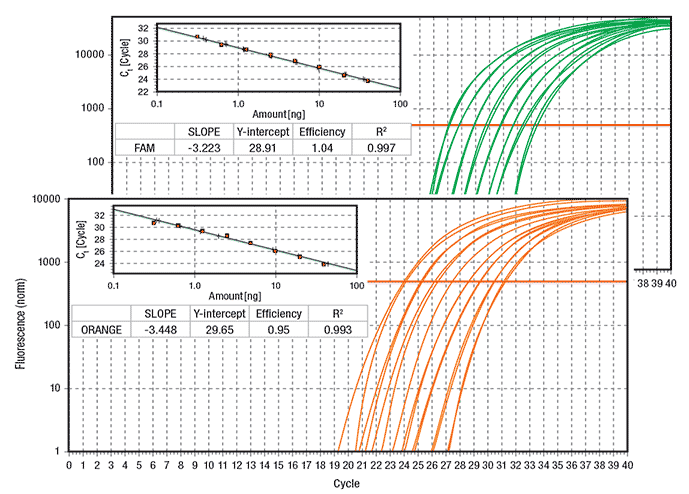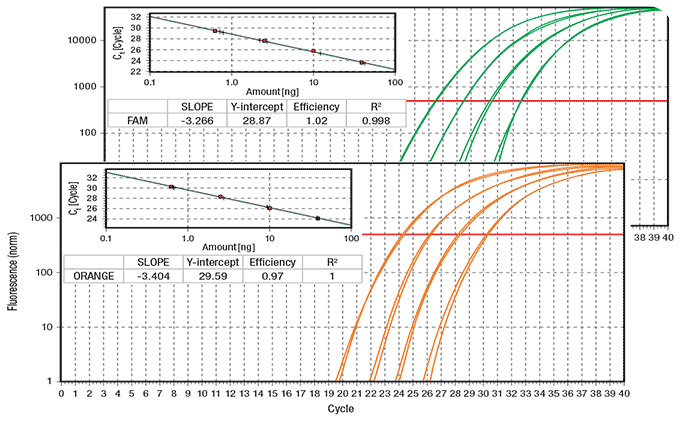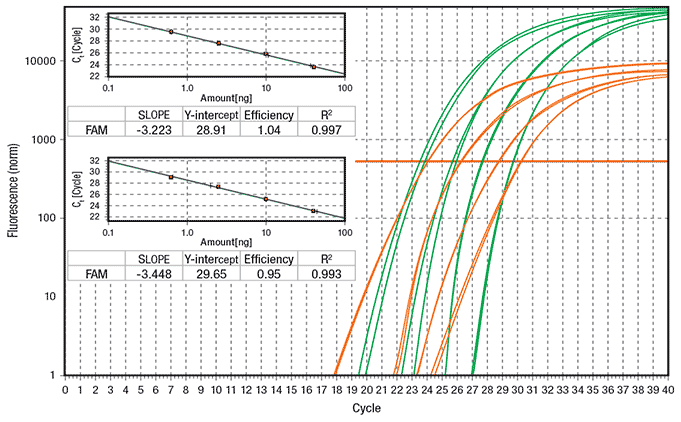Multiplex Real-Time PCR
Multiplex qPCR employing probe-based chemistries is a demanding application that often requires extensive optimization and validation.
The combination of the multi-channel Eppendorf® Mastercycler® ep realplex4 S realtime PCR cycler and KAPA PROBE FAST qPCR Kits from Kapa Biosystems provides an industry-leading solution for high-performance, fast multiplex qPCR without the need for extensive optimization.
Introduction
Recent developments in multiplex PCR make it possible to rapidly identify, genotype and quantify multiple DNA targets simultaneously in a single reaction. Multiplex qPCR is particularly wellsuited to applications such as gene expression analysis, SNP genotyping, copy number variation (CNV), genetically modified organism (GMO) detection, pathogen detection, and monitoring the efficacy of drug treatment.
The advantages of multiplex qPCR include increased through-put, reduced reaction cost, and conservation of limited sample material. Multiplex qPCR often requires considerable optimization and individual assays must be validated prior to multiplexing. Careful assay design is critical to avoid primer complementarity and to ensure efficient amplification of each target amplicon.
Multiplex qPCR requires an instrument capable of multi-channel detection and a qPCR reagent capable of maintaining high reaction efficiency of all amplicons in a multiplex format. The Eppendorf® Mastercycler® ep realplex4 S real-time PCR system features an ultrafast, Peltier-controlled thermoblock (6 °C/sec heating and 4 °C/sec cooling), allowing for the completion of a 40-cycle qPCR reaction in less than 1 hr. The realplex4 Peltier units also ensure accurate temperature control as well as high block homogeneity, essential parameters for high-performance qPCR. The optical module comprises an array of 96 LEDs that are preselected and equalized so that all wells are excited uniformly, eliminating the requirement for a passive reference dye (e.g., ROX), used to normalize fluorescent signals in many conventional qPCR instruments. As a result, the channel normally utilized for the passive reference dye is available for multiplexing. The realplex4 also utilizes Photo Multiplier Tube (PMT) technology for signal detection, the most sensitive and affordable detection technique currently available. The Eppendorf® Mastercycler® ep realplex4 S is a fourchannel system and provides full multiplex flexibility through emission filters corresponding to 520/550/580/605 nm.
KAPA PROBE FAST qPCR Kits from Kapa Biosystems contain a ready-to-use master mix for highly sensitive and accurate realtime PCR using sequence-specific probe chemistries. The kits are compatible with a variety of probe chemistries including TaqMan®, FRET probes, scorpion probes, and molecular beacons. KAPA PROBE FAST qPCR Kits have been specifically formulated for high-speed qPCR, without compromising reaction efficiency and reproducibility. Kits are optimized for versatility and suitable for a broad range of applications including gene expression, SNP genotyping, and multiplexing. KAPA PROBE FAST qPCR Kits are supplied with an antibody-based hot start, enabling a short initial activation hold time at 95 °C. PCR protocols using KAPA PROBE FAST are based on reduced extension times that allow for a significant reduction in PCR cycling time without the risk of compromising reaction performance.
Methods
To demonstrate the ability to perform fast multiplex qPCR without compromising reaction efficiencies, a set of eight 2-fold (Figure 1) or four 4-fold serial dilutions of human genomic DNA were amplified using either single (Figure 2) or duplex (Figure 3) assays and a fast-cycling protocol (3 min at 95 °C initial activation, 40 cycles of 3 sec at 95 °C and 20 sec at 60 °C). Amplification was performed in full-skirted Eppendorf® Twin.tec plates with optical clear heat-sealing film using the realplex4 S real-time PCR system. Two hydrolysis probe-based qPCR assays were used in this study (Table 1). Dye calibration for the Cal Fluor® Gold 540 TaqMan assay was performed as described by Biosearch Technologies.
The resulting log amplification plots and standard curves for each assay performed separately (Figure 2) and in duplex (Figure 3) indicate that neither the cycle threshold (CT), nor the efficiency of the qPCR reactions were compromised as the result of the multiplex format. The differences in mean CT values (ΔCT) for each of the four 4-fold dilutions in both the single and duplex reactions indicate comparable performance between single and duplex reactions (Table 2). The fast protocol results in a time saving of 56 min relative to a conventional slow protocol (10 min at 95 °C initial activation, 40 cycles of 15 sec at 95 °C and 60 sec at 60 °C) when performed on the realplex4 S real-time PCR system.

Figure 1.Highly reproducible and efficient results for both amplicons across an 8-point dilution series of human genomic DNA were obtained when assayed in duplex using a fast-cycling protocol. Standard curves were generated using 2-fold dilutions of human genomic DNA (40 – 0.3125 ng per 20 μL reaction), tested in quadruplicate.

Figure 2.Single qPCR reactions. Data showing log amplification plots of a set of four 4-fold serial dilutions of hgDNA ranging from 40 – 0.625 ng per reaction using a fast 2-step cycling protocol. Data represents four replicates for each DNA dilution. The ActB and ERBB2 assays are shown in green and orange, respectively.

Figure 3.Duplex qPCR reactions. Data showing log amplification plots of a set of four 4-fold serial dilutions of hgDNA ranging from 40 – 0.625 ng per reaction using a fast 2-step cycling protocol. Data represents four replicates for each DNA dilution. The ActB and ERBB2 assays are shown in green and orange, respectively.
To continue reading please sign in or create an account.
Don't Have An Account?